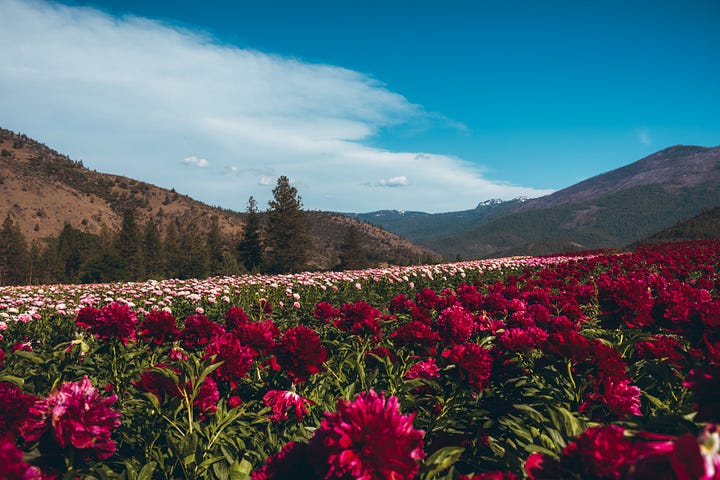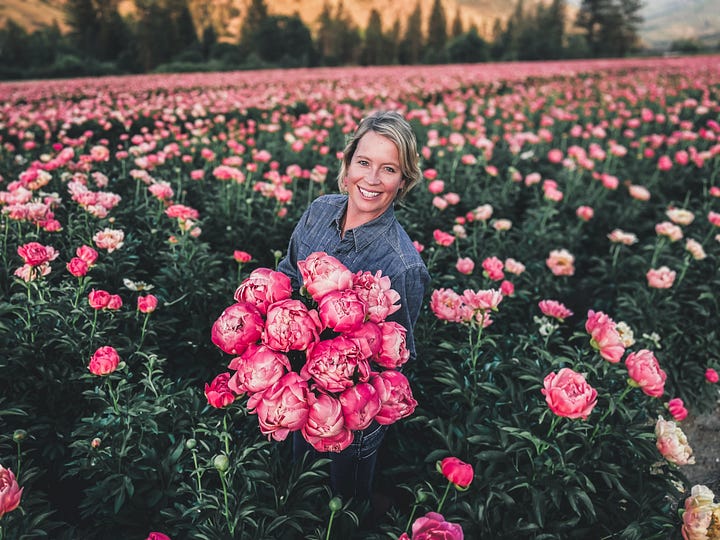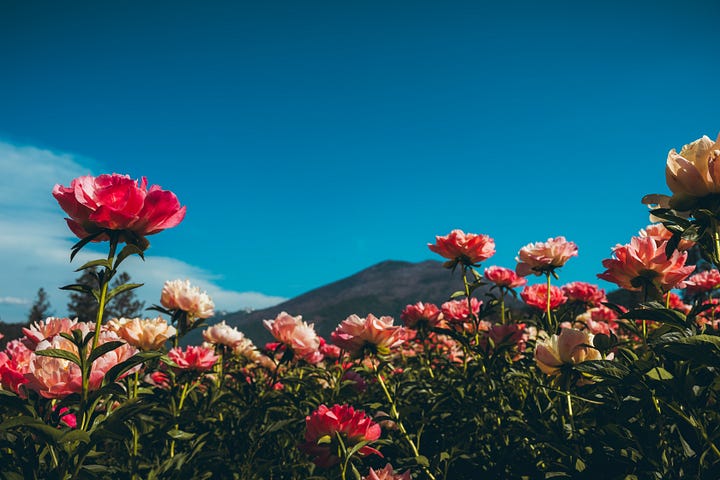Creating a Life Full of Adventure: Interview with California Peony Company Co-Founder, Anne Hilton
This week’s interview is with Anne Hilton, the co-founder of California Peony Company along with her husband Brent.
Anne and Brent met while studying abroad in New Zealand. They dreamed of creating a life full of adventure and living close to nature. After their twin sons were born, they moved to a remote part of Northern California where Anne grew up. They hoped to be able to work together by farming their land and to keep the vision they’d dreamed up in New Zealand alive.
Over the years Anne and Brent got creative on how to bring their dreams to life. In 2016, the idea for a Peony farm started as a simple dinner table conversation. Two years later that got to work making it a reality. Since then, with support from friends, family, and their twin sons, Anne and Brent have lived out their dreams and continued to expand the farm.
I couldn’t wait to talk to Anne. I wanted to know: How does one actually start a Peony farm? What mindset allowed her and her husband to create a life full of adventure? What was it like for them to take the leap and start the farm? What has she learned from farming? How has her relationship with uncertainty and doubt changed throughout the journey?
We chatted about:
What it was like to actually start a Peony farm
How farming has transformed her relationship to uncertainty
What she’s learned from embracing discomfort
Living a life full of adventure
The long-term vision for her life and the California Peony Company
Note: The following interview has been lightly edited for clarity and length. While every effort has been made to preserve the integrity of the conversation, please be aware that the quotes may not be verbatim but reflect the essence of the dialogue.
What are you up to in life right now?
One aspect of farming that I love is living with the seasons. I think a lot of people picture farmers in winter sitting cozily by the fire, but really winter is our planning phase when we get other projects done.
We’re currently preparing for tax season and doing all the accounting. My husband and I both wear a lot of hats. We’re going through data and looking at past harvest seasons. Last year we cast a wide net selling our stems and reaching different markets. We’re looking at which avenues were successful and which weren’t. Our goal is to be more profitable this year.
We are creating our cultivation plan for 2024 and sent off some soil samples. We’re developing a plan for nutrients and the specific weeds that we want to focus on eradicating this year, and how to do that without hurting our soil. We’re also building a walk-in cooler in our big metal barn that will help us have more space to organize our product that we ship out direct-to-customer and on-farm sales.
Just a few projects we’re working on right now!
On your website, you wrote that this whole thing started as a dinner table conversation. How did it go from that to you and your husband saying, “Okay, we're actually going to do this?” What did it feel like to make the leap?
I think it’s a culmination of a lot of projects and big ideas my husband and I have had in the past. There was a slow build. My husband and I met when we were really young, which is a huge blessing because we've been building a life together for almost 20 years at this point. We've been building our future together for half of our lives. We had our twin boys really young as well, and it got us thinking about building a life for our family. We wanted to build a life of exploring and adventuring, but suddenly we had this unit that we were figuring out how to propel forward.
What really started the dinner table conversation was that we love living in this very remote area. We live outside of an old gold mining town of about 50 people. We have wilderness and mountains all around us, and can quickly access all the hobbies we like to do. My husband and I’s dream was to create a life where we were working together and didn't have a traditional 9 to 5. We wanted to be able to provide a life for our family in a remote area, and we needed to be pretty creative to do that. We had some family land which has been really helpful. Traditionally, this area is known for alfalfa and cattle ranching. We didn’t have enough land for those types of operations so we needed to find a specialty crop. Relying on the local population as your only customer base is tricky when you live in a really remote area because there are not that many people! We knew we needed something that we could export. It just came down to talking and dreaming and figuring out what we could do with our land. We just kept talking and researching the heck out of it. I think one factor in our success is we're both fairly cerebral. We really researched the infrastructure and the market. How would flowers do in our climate? What grows well here? As we did more research, we became more and more confident that we could pull it off.
I think your question was: What did it feel like to actually make that leap? It got to the point where my husband was sitting at a desk, and I was working at the high school in a pretty stressful profession, and we just decided to pull the plug. We just got to the point where we said: “We're not getting any younger.” We knew that it was going to take time to invest in this crop because it takes a long time for peonies to mature. It just felt like now or never. Between the two of us, there really isn't a break pedal. We’re both willing to take risks. It was really exciting when we both decided to go for it and put everything we made into making the business work over the next four years. It was definitely pretty scary as well, but we both had day jobs through the whole initial process. We were exhausted but we still had that safety net if it didn't work out.


You two outlined the life that you wanted to have and worked backward to make it happen, which seemed to open up a lot more possibilities than feeling like you could only get from point A to point B.
Farming has really taught us a lot about making plans and working backward. We have a crop that we harvest only two and a half weeks of the year but requires planning way in advance. Peonies take 3 to 5 years to become established enough to sustain a harvest. It can be overwhelming and daunting to think that far out, but then you focus on the small steps you need to take right now to get a project done, and you know you’ll be ready to reap the rewards in 4 years.
I have to ask: What’s the most honest way you would describe the process of starting a Peony Farm?
It's hard. It's a lot of manual labor. What we have learned is that there is no one right way to start a Peony farm. Because of that, there is a lot of uncertainty, but we have a great network of other peony farmers that we've slowly developed and they have been so helpful. That said, a number of them live in Alaska and their growing season and land are very different from ours. They’re dealing with things like permafrost layers so a lot of their techniques do not work here in Northern California.
There is also the UC Davis Ag Extension office which has employees here in our county to help with ag advising, but they specialize in Alfalfa. We’ve reached out to them for assistance, but we're kind of pioneering a crop in our area so there’s only so much they can know. There’s a lot of trial and error and just having to trust what we’ve been doing. I mean once the plants are in the ground, they're in the ground for years. They're probably going to outlive us. It's stressful in the sense that there's no one right way. There isn't a blueprint to do it. You have to learn to research and then just trust your intuition.
As you said, there’s a lot of inherent uncertainty in harvesting peonies given that they take 3-5 years to become sustainably harvested. Plus, you’re pioneering this crop in your area. How has this experience changed your relationship to uncertainty and doubt?
I'm a very optimistic person and see things with rose-colored lenses. That's always been my role, whether it’s in family dynamics or friend groups. I genuinely feel very positive a lot of the time but, as humans, we’re not supposed to be in that state all the time. I think you have to embrace that there are going to be really hard times when you feel uncomfortable or when things are stressful. That’s okay. Part of what I really like about farming is that it feels so real and raw. We have a lot of friends and family that will come and help us. They've been a part of this dream and process from the beginning. A lot of them crave coming up and doing physical labor, even though they're not really physical laborers, because there’s this beauty in experiencing the raw franticness of the harvest and being physically exhausted at the end of the day.
Without those low, uncomfortable, uncertain times, it’s hard to really cherish the wins. I like the rawness of feeling it all. I think as a society we’ve tried to take away that uncomfortable feeling and uncertainty and put a lot of padding and comfort around life experiences. We’ve created these platforms where life looks beautiful in so many ways. I think that has made it harder for people to get comfortable with being uncomfortable. For example, we have a huge frost coming in, and our Coral Charms are not in a great state to withstand a frost. They're going to have some scarring, but there's nothing we can do about that. You can dwell on it or you can figure out how to move on. It's gotten easier over the years to learn how to do that.


What do you think you’ve learned from farming that has translated into the bigger picture of your life?
When I was a school counselor, I relied on a technique called solution-focused counseling. You don’t focus on the past but you look at: How can I make tomorrow a little bit better? What are the small steps I can take to get to that based on my strengths? Over time, how can you use those small improvements and your strengths to create a solution for the problem? Farming is really humbling, but it’s also shown me how resilient you can be. It’s taught me the resiliency of saying, “Okay, this is a major problem, but it's not in our control. Instead of it being a major roadblock, what can we do tomorrow?” It’s helped me put into practice the ideology of finding a solution and figuring out the next step. There’s a romantic quote that I love which says: “Bloom where you are planted.” I really believe that.
We don't all have ideal situations, and I think people can look at our farm and pictures of it and think, “Oh, my gosh! That's perfect! That must be the best life ever.” It's really hard and can be really stressful, but we do have this small piece of land where we’ve figured out how to grow a specialty crop, and we’re making it work. Our boys have been on this journey with us, and I’m so glad that they’ve been able to see, “Okay, here is what we have and we’re going to figure out how to make it into what we want.” We believed in it, dreamed that we could make it happen, and it's happening. The whole process and experience has been empowering. It makes you feel like you can do anything. Farming is such a real way to learn that you can have adversity and keep going as long as you keep figuring out the next step.
I loved the story you wrote about you and your husband on your website where you spoke about meeting abroad in New Zealand and dreaming about creating a life full of nature and adventure. You two have created that! What’s the mindset you have to be in to create a life that's full of adventure? How have you two kept that dream alive over the years?
There are a lot of times when we'll see friends or family living a much more consistently comfortable existence and think, “Maybe that would be nice.” Then we realize that we’d have to work hard to pay for a vacation to go to a place like we’re creating right now. We have to remind ourselves that this is a long dream. When we met in New Zealand, we were going on adventures in nature and doing things like camping, fishing, and rock climbing. We even stitched into our Chaco straps at the time, “Keep the dream alive.”
We had this idea of living simply on a homestead so that we could continue these outdoor adventures. I grew up here and we moved back when our boys were really young, about 2 years old, because we wanted them to grow up doing active things with us. We wanted them to become resilient problem solvers. Right now it is winter time. We love backcountry snowboarding and skiing together as a family, and we're able to go do that for a couple of hours in the morning, and then come back and get our day going or go after school. My husband is really into Steelhead fishing and there are several rivers around here where he can go do that in the morning. We’ve created a life to support those hobbies. What's been kind of interesting, though, is that the adventures and dreams that we're having are becoming less about those activities. We do get a lot of fulfillment from them, and they are great ways to stay in shape and exercise, but our farm and our jobs have become more of the adventure. It's what we're thinking about and dreaming about and getting excited about. We want to leave our property less and less. We’ve created the adventure.


That’s really beautiful. When you think about the big picture of what you’re building toward at California Peony Company, what does that look like?
There are hundreds of varieties of peonies. We're hoping to get different landscape varieties in the ground. We have about 15 main varieties that are great for cut flower production, but we want a lot more varieties for landscape. We'll be cultivating peonies for root production which will take place in the fall.
Eventually, we hope that we have two really busy times of the year and get things to the point where we can spend a lot more time in South Carolina where my husband is from. We hope to live a life where we are working the farm and living here but spending more time in South Carolina during the winter and summer.
Our boys are 15 and will be starting their own adventures in about three and a half years. We're going to be very young empty nesters. I'm not saying we're excited for our kids to leave. We love them, and I don't know what we're gonna do when they're gone, but it'll be a new phase for us. We're hoping to have a little bit more flexibility and mobility and to create new experiences together.




